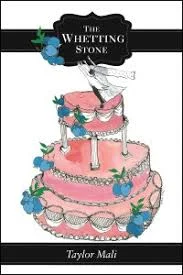Dark and Without Despair
The Whetting Stone, by Taylor Mali, is life-affirmingly dark. Life-affirming, not in a “happily-ever-after” or “light-at-the-end-of-the-tunnel” way, being a collection of poetry in dialogue with death and the suicide of Taylor Mali’s wife, Rebecca. It is life-affirming in that, although intense grief is present throughout, Mali remains fully present in that grief. He is committed to whole engagement without turning away. It is an engagement without need to polish, romanticize, sensationalize, solve, or fix anything. It is a fierce and vulnerable full-bodied allowing-for-all-that-life-is, which includes brutal loss and pain. Grief, too, is life and alive. And, as Mali expresses in “Grief Moves”, his opening poem that addresses his father’s death, there is a life-affirming sensuality in allowing this darkness to touch the core of your being:
how my wife let me fill her full
of my tears when I came home,
silent, hard, and broken;
[…]
how we came together, loss now
a moving thing between us. […]
“Grief Moves” foreshadows further loss. But first it is followed by “Making Ravioli,” an extended relationship metaphor that is bubbling over with delicious embodied imagery. There is “holding” and “stirring” and “kneading” and “gripping” and “…together, using all four hands.” The first stanza beautifully echoes “Grief Moves” with a brokenness that appears again and again:
If you were the flour,
I would say you hold me like the eggs,
broken and mixed up as I am.
There even seems to be a bit of humor with Rebecca naming the not-so-perfect piece of ravioli, “deformioli.” Here is a glimpse of Rebecca alive and participating in full ravioli-producing union. And then, third poem into this narrative, with no metaphor about it, in the first stanza of “Six Stories:”
Years ago, on a Monday morning, my wife,
dressed for work in a new suit and elegant shoes,
stepped outside the window and fell to her death
six stories below.
Mali continues to describe six possible “stories” that led to Rebecca’s death, each story a descending stanza. The first addresses inherited trauma of being the daughter of a Holocaust survivor:
Perhaps the first is the one about the tattoo on her father’s arm,
the dark number he never spoke of.
The Whetting Stone is not an easy read. Darkness permeates. Mali does, however, have a way of lightening the weight of the sorrow for his reader. Fine details and clear particulars, which Mali does so well, fill this tragedy and make it bearable. It’s those concrete details that, by the end of this book, have you longing for a stranger, longing to have met her, longing for Rebecca’s survival; and yet it’s those same details that make the sorrow bearable and even call you back to read and re-read.
I’ve come to think of this collection as the Rebecca poems. There are a few poems that read as letters written directly to Rebecca, posthumously. They seem to ground the entire collection. They include: “Twelfth Anniversary,” “Things We Both Know That I Still Have To Tell You,” “Meeting at Monet’s Water Lilies,” and “News of My Divorce Reminds Me of Your Death.”
From “Things We Both Know That I Still Have to Tell You:”
You are not ugly, old, broken, broke, or stupid.
And you certainly are not fat. […]
In “Twelfth Anniversary,” it’s Rebecca’s voice telling us:
I’m not the type of woman who would drive such a car!
This car should be driven by someone peppy named Cindi
who dots her eyes with flowers, hearts, or stars.
That was possibly another brief moment of humor on Mali’s part as he finds his wife “aghast” to admit that she owns a red “sports car.” It’s also another glimpse into the perpetual dark that infiltrated Rebecca’s life.
In “Elegy for the Lighter Sleeper,” Mali writes of facing that darkness in the darkness of night.
She the lighter sleeper, needed noise not to think,
needed it to sink into the rock and tide, even if
it only be the late-night sweeper come to sweep
the dust and grime and darkness from the ground
With this entire collection as a whole, Taylor Mali has enlarged the conversation of mental health and suicide with gentleness, dignity, and authority. In particular, I’m thinking of the above poem “Elegy for the Lighter Sleeper” and “Depression, Too, Is a Kind of Fire”.
In “News of My Divorce Reminds Me of Your Death,” grieving now at the end of his second marriage, he lovingly addresses Rebecca, his first wife, in sonnet:
Lover, at last, please leave me, after all these years.
You have cried enough. Leave me to these tears.
Throughout this book, we are witness to the reunion or union of Taylor and Rebecca, in grief and in love. And we, too, as readers, must let go of the happy ending, as Mali himself has reconciled in “Sestina:”
[…] I knew she
was not all right, and I was not
her knight or savior. […]
“Sestina” is the nineteenth and last poem in this brief, but epic, work. It concludes with three of the most chilling lines I have ever read. Three lines that honor the fullness of Rebecca. This is a book worth having on your shelf, so I am refraining from quoting those and many others so that you can experience them on your own.
Mali does not try to force a meaning upon his wife’s suicide, but by being present and bravely engaging with his grief, he has provided us with poetry that is deeply meaningful and significant. The Whetting Stone is not a work of despair. There is no despair. There are poems, well-crafted poems and a raw accounting. It is clear language given to the unspeakable. Poetry made possible because of the depth of the darkness that Taylor Mali was willing to embrace and bring to the surface to share with us. It is why poetry matters.
Comments may be directed to Jo Freehand, Contributing Editor at: jfreehand@verizon.net


